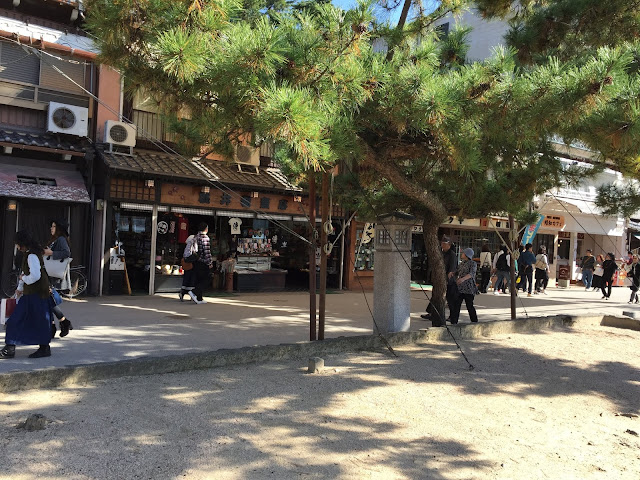Part 2: Hiroshima | A Memorable Day Trip You Can't Miss
Miyajima Island
 |
| Itsukushima Shrine At Miyajima |
 |
| Pathways Of Itsukushima Shrine |
During low tide, the area around the shrine looked like mud. The best view to see the shrine and torii would be during high tide. Go to this link to check the timing of high tide. Nevertheless, we absolutely loved this shrine. It was so beautiful and amazing. The interior was well maintained and offered peaceful and tranquility feeling. Do some research on the timing of high tide so you can see the shrine when water is around as if the gate and shrine are floating in the sea. I recommend you to wear comfortable, waterproof shoes to ensure you don't get wet or face any issues with tide receding.
 |
| Pathways Of Itsukushima Shrine |
It opens daily from 6:30am to 6pm or 5pm in winter. Admission fee for floating shrine is 300 yen and 500 yen including Treasure Hall. We spent two days and 1 night in Hiroshima. On day one, we travelled to Kintaikyo Bridge and Miyajima. We stayed one night in Hiroshima. We visited Hiroshima Peace Memorial Museum on the following day. While you can tour the atomic bomb memorials and travel to Miyajima Island in one day, I recommend spending at least 2 days in Hiroshima.
 |
| Low Tide At Itsukushima Shrine |
The floating shrine consists of a prayer hall, a main hall, and even a Noh theater stage. All of the different buildings of the shrine are connected by boardwalks above the sea. During high tide, visitors can take boat rides through the torii gate and along the bay.
Although visitors cannot enter the shrine after sunset, the shrine is beautifully illuminated until 11pm.
 |
| Pathways Of Itsukushima Shrine |
Most tourists visit Miyajima as a day trip from Hiroshima. I recommend you to stay in Hiroshima, which has more things to do and eat there. If you stay overnight, you get a different experience when there is no crowd in the evening and early next morning. Travellers staying in ryokan, or Japanese-style inns on the island, can enjoy strolling along the pier at night time to view the shrine.
 |
| Five Storey Pagoda |
The five storey pagoda is attached to Senjokaku Pavilion, a Buddhist hall. If your travel schedule is not tight and you are a hiking enthusiast, feel free to drop by the pagoda to breath fresh air before you hike in Mount Misen. At the top of the mountain, there is a spectacular view.
 |
| World's Largest Rice Scoop In Miyajima Island |
Miyajima is popular for its rice scoops (杓子, known as shakushi in Japanese), a wooden spatula used to serve steamed rice. You can even gaze upon the World's Largest Spatula (approximately 5 meters long), showcased along Omotesando, the main shopping street. Many shops are selling the similar souvenirs for the same prices such as rice scoops and miniature floating Torii gate which are the most common items.
 |
| Deers In Miyajima Island |
Miyajima is home to more than a thousand Sika deer. The deers in Nara are aggressive and will snatch treats from you even when you are not ready. Miyajima deers are different. They're friendly, thus, you can easily pet them and feed them. They’ve been protected from hunting and abuse. The deer in Miyajima (known as Itsukushima in Japanese) were considered holy deers, sacred messengers from gods.
 |
| Open Space Where You Can Relax And Spot Deers |
 |
| Shopping Street In Miyajima Island |
 |
| Lunch At Miyajima |
There are many little restaurants and vendors in the shopping streets near the shrine. Eating by the seafront in the restored classical houses will be more expensive than simple eateries along the streets. We had a good lunch at a restaurant along shopping street. Fried oyster, udon soup, ebi and beef rice were delicious with reasonable food prices. After lunch, we headed back to Hiroshima.
 |
| Lunch At Miyajima |
Miyajima-cho, Hatsukaichi-shi, Hiroshima
Access
Accessible from Hiroshima Station by taking the JR Sanyo Line to Miyajimaguchi Station. From Miyajimaguchi Station, there is a short walk to the ferry pier, from where ferries depart frequently to Miyajima. There are two ferry companies operating from this port: JR and Matsudai. Both companies' ferry rides take 10 minutes and both cost 180 yen one way. The Japan Rail Pass is valid on JR ferries.
Going to Hiroshima takes 1 hour and 42 minutes from Kyoto by shinkansen, a bullet train. From Osaka, you need 1 hour and 33 minutes. Actually, you can visit Hiroshima as a day trip from these cities but not from Tokyo.
You can use your JR Pass to take the Tokaido Shinkansen line's Hikari bullet train from Tokyo Station to Shin-Osaka Station, Shin-Kobe Station or Himeji Station. Once in one of these stations, you can transfer to the Sanyo Shinkansen (Sakura train) and arrive in Hiroshima at Hiroshima Station.
Going to Hiroshima takes 1 hour and 42 minutes from Kyoto by shinkansen, a bullet train. From Osaka, you need 1 hour and 33 minutes. Actually, you can visit Hiroshima as a day trip from these cities but not from Tokyo.
You can use your JR Pass to take the Tokaido Shinkansen line's Hikari bullet train from Tokyo Station to Shin-Osaka Station, Shin-Kobe Station or Himeji Station. Once in one of these stations, you can transfer to the Sanyo Shinkansen (Sakura train) and arrive in Hiroshima at Hiroshima Station.
Comments
Post a Comment